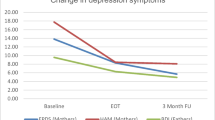Abstract
Intervening with depressed women during their childbearing years, especially with those on low incomes, is critically important. Not only do mothers and expectant mothers suffer unnecessarily, but their untreated depression has critical negative consequences for their families. Despite this, these women have proven especially difficult to engage in psychotherapy. In this paper we describe several adaptations and additions we have made to a brief form of Interpersonal Psychotherapy (IPT) to meet the needs of mothers and expectant mothers living on low incomes in the community who suffer from depression, but face significant practical, psychological, and cultural barriers to engaging in and staying in treatment. In addition, we present some preliminary data on the extent to which our enhanced, brief IPT approach promotes improvements in treatment engagement and retention relative to usual care for expectant mothers on low incomes.
Similar content being viewed by others
References
American Psychiatric Association Steering Committee on Practice & Guidelines. (2000). American Psychiatric Association practice guidelines for the treatment of psychiatric disorders: Compendium.
Armstrong, H., Ishike, D., Heiman, J., Mundt, J., & Womack, W. (1984). Service utilization by black and white clientele in an urban community mental health center: Revised assessment of an old problem. Community Mental Health Journal, 20, 269–281.
Azocar, F., Miranda, J., & Dwyer, E. V. (1996). Treatment of depression in disadvantaged women. Women & Therapy, 18(3–4), 91–105.
Beck, J. (1995). Cognitive therapy: basics and beyond. New York: Guilford Press.
Belle, D. (1990). Poverty and women’s mental health. American Psychologist, 45, 385–389.
Boyd-Franklin, N., & Lockwood, T. (1999). Spirituality and religion: Implications for psychotherapy with African American clients and families. In F. Walsh (Ed.), Spiritual resources in family therapy (pp. 90–103). New York: Guilford.
Cooper, L. A., Brown, C., Ford, D. E., Vu, H. T., & Powe, N. R. (2001). How important is intrinsic spirituality in depression care? A comparison of the views of White and African American primary care patients. Journal of General Internal Medicine, 16, 634–638.
Corrigan, P., River, L., Lundin, R., Wasowski, K., Campion, J., Mathisen, J., Goldstein, H., Bergman, M., Gagnon, C., & Kubiak, M. (2000). Stigmatizing attributions about mental illness. Journal of Community Psychology , 28, 91–103.
Department of Health and Human Services (DHHS; 1999). Mental Health: A Report of the Surgeon General. Rockville, MD: U.S. Department of Health and Human Services, Substance Abuse and Mental Health Services Administration, Center for Mental Health Services, National Institutes of Health, National Institute of Mental Health.
Elkin, I., Shea, M. T., Watkins, J. T., Imber, S. D., Sotsky, S. M., Collins, J. F., et al. (1989). National Institute of Mental Health Treatment of Depression Collaborative Research Program: general effectiveness of treatments. Archives of General Psychiatry, 46(11), 971–982.
Field, T. (2000). Infants of depressed mothers. In S. Johnson & A. Hayes (Eds.), Stress, coping, and depression. Mahwah, NJ: Erlbaum.
Germain, C. B. (1983). Using social and physical environments. In A. Rosenblatt & D. Waldfogel (Eds.), Handbook of clinical social work (pp. 110–133). San Francisco: Jossey-Bass.
Greeno, C. G., Anderson, C. M., Shear, M. K., & Mike, G. (1999). Initial treatment engagement in a rural community mental health center. Psychiatric Services, 50, 1634–1636.
Grote, N. K., Bledsoe, S. E., Larkin, J., & Brown, C. (in press). Depression in African American and White women with low-incomes: The role of chronic stress. Journal of Health and Social Policy.
Grote, N. K., Bledsoe, S. E., Swartz, H. A., & Frank, E. (2004). Feasibility of providing culturally relevant, brief interpersonal psychotherapy for antenatal depression in an obstetrics clinic: a pilot study. Research on Social Work Practice, 14, 397-407.
Grote, N. K., Swartz, H. A., Geibel, S. L., Zuckoff, A. M., & Frank, E. (under review). A randomized controlled trial of culturally relevant brief interpersonal psychotherapy for perinatal depression. American Journal of Psychiatry.
Grote, N. K., Zuckoff, A., Swartz, H. A., Bledsoe, S. E., & Geibel, S. L. (in press). Engaging women who are depressed and economically disadvantaged in mental health treatment. Social Work.
Gunderson, J. G., Fonagy, P., & Gabbard, G. O. (2002). The place of psychoanalytic treatments within psychiatry. Archives of General Psychiatry, 59, 505–510.
Heyl, B. S. (2001). Ethnographic interviewing. In P. Atkinson, A. Coffey, S. Delamont, J. Lofland, L. Lofland (Eds.), Handbook of ethnography. London: Sage Publications.
Hobfoll S., Ritter C., Lavin J., Hulszier M., & Cameron, R. (1995). Depression prevalence, incidence among inner-city pregnant and postpartum women. Journal of Consulting and Clinical Psychology, 63, 445–453.
Howard, K. I., Kopta, S. M., Krause, M. S., & Orlinsky, D. E. (1986). The dose-effect relationship in psychotherapy. American Psychologist, 41(2), 159–164.
Jacobson, N. S., Martell, C. R., & Dimidjian, S. (2001). Behavioral activation treatment for depression: Returning to contextual roots. Clinical Psychology-Science & Practice, 8(3), 255–270.
Kemp, S., Whittaker, J., & Tracy, E. (1997). Person-environment practice: the social ecology of interpersonal helping. Hawthorne, NY: Aldine de Gruyter.
Klerman, G. L., DiMascio, A., Weissman, M. M., Prusoff, B. A., & Paykel, E. S. (1974). Treatment of depression by drugs and psychotherapy. American Journal of Psychiatry, 131(2), 186–191.
Lewinsohn, P. M. (1974). A behavioral approach to depression. In R.J. Friedman & Katz, M. (Eds.). The psychology of depression: contemporary theory and research (pp. 157–178). Oxford, England: Wiley.
Maslow, A. (1943). A theory of human motivation. Psychological Review, 50, 370–396.
Maynard, C., Ehreth, J., Cox, G., Peterson, P., & McGann, M. (1997). Racial differences in the utilization of public mental health services in Washington State. Administration and Policy in Mental Health, 24, 411–424.
McKay, M. M., & Bannon, W. M. (2004). Engaging families in child mental health services. Child and Adolescent Psychiatric Clinics of North America, 13, 905–921.
Miller, W. R., & Rollnick, S. (2002). Motivational interviewing: preparing people for change (2nd ed.). New York, NY, USA: Guilford Press.
Miranda, J., Azocar, F., Komaromy, M., & Golding, J. M. (1998). Unmet mental health needs of women in public-sector gynecologic clinics. American Journal of Obstetrics and Gynecology, 17, 212–217.
Miranda, J., Azocar, F., Organista, K., Dwyer, E., & Areane, P. (2003). Treatment of depression among impoverished primary care patients from ethnic minority groups. Psychiatric Services, 54, 219–225.
Miranda, J., Azocar, F., Organista, K., Munoz, R., & Lieberman, A. (1996). Recruiting and retaining low-income Latinos in psychotherapy research. Journal of Consulting and Clinical Psychology, 64, 868–874.
Miranda, J., Chung, J. Y., Green, B. L., Krupnick, J., Siddique, J., Revicki, D. A., et al. (2003). Treating depression in predominantly low-income young minority women: a randomized controlled trial. Journal of the American Medical Association, 290(1), 57–65.
Moore, G., Cohn, J., & Campbell, S. (2001). Infant affective responses to mother’s still face at 6 months differentially predict externalizing and internalizing behaviors at 18 months. Developmental Psychology, 37, 706–714.
Murray, L., & Cooper P. (Eds.). (1997). The role of infant and maternal factors in postpartum depression, mother-infant interactions, infant outcome. In L. Murray and P. Cooper (Eds.), Postpartum depression and child development (pp. 111–135). New York: Guilford.
Paykel, E. S., Hart, D., & Priest, R. G. (1998). Changes in public attitudes to depression during the Defeat Depression Campaign. British Journal of Psychiatry, 173(12), 519–522.
Reynolds, S., Stiles, W. B., Barkham, M., & Shapiro, D. A. (1996). Acceleration of changes in session impact during contrasting time-limited psychotherapies. Journal of Consulting & Clinical Psychology, 64(3), 577–586.
Rogers, C. (1967). The conditions of change from a client-centered viewpoint. In B. Berenson & R. Carkhuff (Eds.), Sources of gain in counseling and psychotherapy (pp. 71–85). New York: Rinehart & Winston.
Schensul, S. L., Schensul, J. J., & LeCompte, M. D. (1999). Essential ethnographic methods: Observations, interviews, and questionnaires. In Ethnographer’s toolkit 2. Walnut Creek, CA: Alta Mira Press.
Shapiro, D. A., Barkham, M., Rees, A., Hardy, G. E., Reynolds, S., & Startup, M. (1994). Effects of treatment duration and severity of depression on the effectiveness of cognitive-behavioral and psychodynamic-interpersonal psychotherapy. Journal of Consulting & Clinical Psychology, 62(3), 522–534.
Siefert, K., Bowman, P., Heflin, C., Danziger, S., & Williams, D. (2000). Social and environmental predictors of maternal depression in current and recent welfare recipients. American Journal of Orthopsychiatry, 70, 510–522.
Siefert, K., Heflin, C., Corcoran, M., & Williams, D. (2004). Food insufficiency and physical and mental health in a longitudinal survey of welfare recipients. Journal of Health and Social Behavior, 45, 171–186.
Stuart, S. (2006). Interpersonal psychotherapy: a guide to the basics. Psychiatric Annals, 36, 542–549.
Sue, S., Fujino, D. C., Hu, L. T., Takeuchi, D. T., & Zane, N. W. (1991). Community mental health services for ethnic minority groups: a test of the cultural responsiveness hypothesis. Journal of Consulting & Clinical Psychology, 59(4), 533–540.
Swartz, H. A., Frank, E., Shear, M. K., Thase, M. E., Fleming, M. A. D., & Scott, J. (2004). A pilot study of brief interpersonal psychotherapy for depression in women. Psychiatric Services, 55, 448–450.
Swartz, H., Grote, N. K., Frank, E., Bledsoe, S. E., Fleming, M. A. D., & Shear, K. Brief interpersonal psychotherapy (IPT-B): A treatment manual. (unpublished).
Swartz, H. A., Shear, M. K., Frank, E., Cherry, C. R., Scholle, S. H., & Kupfer, D. J. (2002). A pilot study of community mental health care for depression in a supermarket setting. Psychiatric Services, 53, 1132–1137.
Swartz, H. A., Shear, M. K., Wren, F. J., Greeno, C., Sales, E., Sullivan, B. K., & Ludewig, D. (2005). Depression and anxiety among mothers who bring their children to a pediatric mental health clinic. Psychiatric Services, 56, 1077–1083.
Swartz, H., Zuckoff, A., Grote, N. K., Frank, E., Spielvogle, H., Bledsoe, S. E., & Shear, K. (2007). Engaging depressed patients in psychotherapy: Integrating techniques from motivational interviewing and ethnographic interviewing to improve treatment participation. Professional Psychology: Research and Practice, 38(4), 430–439.
Swartz, H. A., Zuckoff, A. M., Frank, E., et al. (2006). An open-label trial of enhanced brief interpersonal psychotherapy in depressed mothers whose children are receiving psychiatric treatment. Depression and Anxiety, 23, 398–404.
Wang, P. S., Lane, M., Olfson, M., Pincus, H. A., Wells, K. B., & Kessler, R. C. (2005). Twelve-month use of mental health services in the United States: results from the National Comorbidity Survey Replication. Archives of General Psychiatry, 62(6), 629–640.
Watkins, J. T., Leber, W. R., Imber, S. D., et al. (1993). The temporal course of change of depression. Journal of Consulting and Clinical Psychology, 61, 858–864.
Weissman, M. M., Bland, R. C., Canino, G. J., Faravelli, C., Greenwald, S., Hwu, H. G., et al. (1996). Cross-national epidemiology of major depression and bipolar disorder. Journal of American Medical Association, 276(4), 293–299.
Weissman, M. M., Gammon, G. D., John, K., Merikangas, K. R., et al. (1987). Children of depressed parents: increased psychopathology and early onset of major depression. Archives of General Psychiatry, 44(10), 847–853.
Weissman, M. M., Markowitz, J. C., & Klerman, G. L. (2000). Comprehensive guide to interpersonal psychotherapy. New York, NY: Basic Books.
Zuckoff, A. M., Swartz, H. A., & Grote, N. K. (in press). MI as prelude to psychotherapy of depression. In H. Arkowitz, H. Westra, W. R. Miller, & S. Rollnick (Eds.). Motivational interviewing in mental health. New York: Guilford.
Zuckoff, A., Swartz, H., Grote, N. K., Frank, E., Bledsoe, S. E., & Spielvogle, H. Engagement session: a treatment manual. (unpublished).
Zweben, A., & Zuckoff, A. (2002). Motivational interviewing and treatment adherence. In W. R. Miller & S. Rollnick (Eds.), Motivational interviewing: preparing people for change (2nd ed.). New York: Guilford Press.
Acknowledgements
This work was supported by grants from the National Institute of Mental Health: 67595, 64518, and 30915 and from funds received from the NIH/NCRR/GCRC Grant MO1–RR000056.
Author information
Authors and Affiliations
Corresponding author
Rights and permissions
About this article
Cite this article
Grote, N.K., Swartz, H.A. & Zuckoff, A. Enhancing Interpersonal Psychotherapy for Mothers and Expectant Mothers on Low Incomes: Adaptations and Additions. J Contemp Psychother 38, 23–33 (2008). https://doi.org/10.1007/s10879-007-9065-x
Published:
Issue Date:
DOI: https://doi.org/10.1007/s10879-007-9065-x




